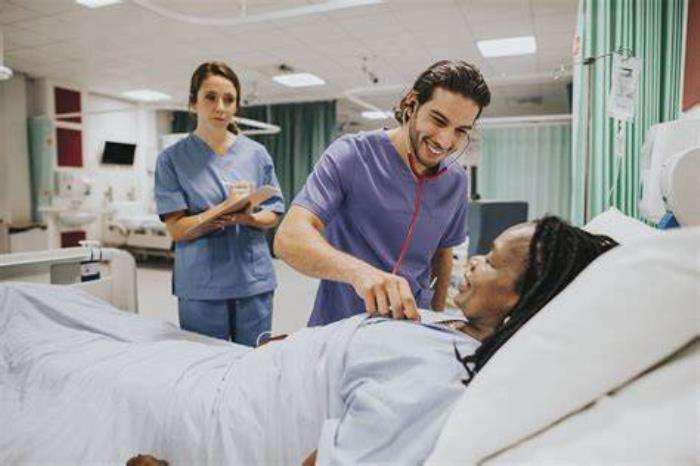Post-transplant rehabilitation refers to a comprehensive program designed to support patients in their recovery following organ transplant surgery. This rehabilitation process helps individuals regain strength, restore physical function, and adapt to the long-term effects of the transplant. It is a vital part of the recovery journey, as it addresses both physical and emotional aspects of healing to ensure optimal outcomes for transplant recipients.
Medical disclaimer: This content is for general awareness and does not replace a doctor’s consultation. For diagnosis or treatment decisions, consult a qualified specialist.
The Role of Rehabilitation in Improving Transplant Outcomes
Rehabilitation plays a crucial role in enhancing post-transplant outcomes by promoting the healing process and improving overall quality of life. By focusing on structured physical therapy, exercise, and education, rehabilitation helps patients recover more effectively, preventing complications such as infection, organ rejection, and physical deconditioning. Rehabilitation programs are tailored to meet the specific needs of transplant recipients, helping them navigate the challenges of recovery and regain their independence.
Why Post-Transplant Rehabilitation Is Essential for Recovery
After transplant surgery, patients face several challenges, including weakened muscles, fatigue, and the adjustment to life with a new organ. Post-transplant rehabilitation is essential because it provides a structured and supervised approach to recovery, helping individuals gradually build strength, increase stamina, and enhance cardiovascular function. It also helps manage side effects related to medications, such as those for organ rejection, while monitoring overall health to ensure the long-term success of the transplant.

Enhancing Physical Function After Organ Transplant Surgery
One of the main goals of post-transplant rehabilitation is to restore physical function after the surgery. Patients often experience muscle weakness, joint stiffness, and fatigue due to prolonged bed rest, surgery, or the impact of their medical condition. Rehabilitation helps individuals regain mobility, improve strength, and increase endurance. Through tailored exercises and progressive activity levels, patients can rebuild their physical capacity and resume daily tasks more independently.
Managing Medications and Side Effects During Rehabilitation
Transplant patients often require medications to prevent organ rejection and manage other post-surgery health issues. However, these medications may have side effects, such as fatigue, muscle weakness, or gastrointestinal issues. Post-transplant rehabilitation programs focus on managing these side effects by incorporating strategies such as proper nutrition, exercise, and lifestyle changes. The rehabilitation team works closely with healthcare providers to ensure that the patient’s medication regimen supports their recovery goals without hindering progress.
The Importance of Mental and Emotional Support in Rehabilitation
The emotional and psychological impact of organ transplant surgery can be profound. Patients often experience anxiety, depression, or stress as they adjust to life after surgery. Post-transplant rehabilitation includes mental health support to help individuals cope with these emotions. This support can include counseling, stress management techniques, support groups, and strategies to improve mental well-being. A holistic approach to recovery that includes emotional support is essential for the overall success of post-transplant rehabilitation.
Tailoring Rehabilitation Plans for Individual Patient Needs
Each transplant recipient has unique health conditions, physical abilities, and recovery challenges. Therefore, rehabilitation plans must be personalized to address these specific needs. Healthcare professionals, including physical therapists, nutritionists, and mental health counselors, collaborate to create individualized rehabilitation plans that consider the patient’s medical history, transplant type, and personal goals. A customized approach ensures the most effective recovery, maximizing the chances of long-term success and improving overall quality of life for transplant recipients.
How Exercise Contributes to Faster Recovery Post-Transplant
Exercise is a key component of post-transplant rehabilitation, helping improve cardiovascular fitness, muscle strength, and overall physical endurance. Gradually increasing physical activity allows heart transplant recipients to rebuild strength, enhance circulation, and accelerate recovery while minimizing complications.
Nutritional Guidance and Its Role in Rehabilitation Programs
Proper nutrition is essential for healing and recovery after a heart transplant. Nutritional counseling focuses on heart-healthy diets, managing weight, and ensuring that patients receive the right balance of vitamins and minerals to support the immune system, muscle recovery, and overall well-being.
Reducing the Risk of Complications and Rejection Through Rehabilitation
Rehabilitation programs help mitigate the risk of complications, including organ rejection, by improving heart function, reducing stress, and optimizing medication adherence. Exercise and a healthy lifestyle enhance immune function and decrease the likelihood of infection or rejection, leading to better long-term outcomes.
The Role of Breathing Exercises and Respiratory Therapy Post-Surgery
Breathing exercises and respiratory therapy are important parts of post-transplant recovery. These exercises help strengthen lung function, improve oxygen uptake, and reduce the risk of respiratory infections. Proper breathing techniques also help reduce anxiety and improve overall comfort during recovery.
Addressing Common Challenges During Post-Transplant Rehabilitation
Patients often face challenges such as fatigue, emotional distress, or limited mobility during recovery. These obstacles can be addressed with gradual, personalized exercise regimens, psychological support, and adaptive strategies to build strength and resilience while respecting each individual’s recovery pace.

Psychological Counseling and Coping Mechanisms During Recovery
Psychological counseling is crucial for managing the emotional and mental health challenges that often accompany heart transplant recovery. Coping mechanisms such as stress management, relaxation techniques, and emotional support help patients navigate feelings of anxiety, depression, or uncertainty during the rehabilitation process.
Social Support and Family Involvement in the Rehabilitation Process
Family involvement is vital for encouraging a patient’s participation in rehabilitation. Social support provides emotional comfort, helps patients stick to their rehabilitation plans, and ensures that they are not facing the recovery process alone. Encouraging family members to attend rehabilitation sessions can also enhance motivation and progress.
Long-Term Benefits of Post-Transplant Rehabilitation Programs
Post-transplant rehabilitation offers long-term benefits, including improved physical fitness, a lower risk of heart-related complications, reduced hospital readmissions, and a greater sense of independence. The rehabilitation program helps patients adjust to their new lifestyle and promotes long-term success in maintaining a healthy heart.
How Regular Monitoring During Rehabilitation Ensures Safety
Continuous monitoring during post-transplant rehabilitation ensures that patients’ vital signs, including heart rate, blood pressure, and oxygen levels, remain within safe limits. Regular assessments help healthcare providers adjust exercise intensity and detect any potential issues early on, ensuring a safe and effective recovery process.
The Impact of Rehabilitation on Returning to Normal Life
Post-transplant rehabilitation plays a crucial role in helping patients return to normal life, including returning to work, social activities, and daily routines. The rehabilitation process restores confidence, improves physical health, and helps patients regain their independence and quality of life.
Overcoming Physical Limitations and Building Strength After Surgery
Rehabilitation programs are designed to address physical limitations caused by surgery and to help rebuild strength gradually. Exercises are carefully tailored to the patient’s abilities, starting with light activities and progressing to more challenging exercises as strength and stamina improve.
Collaboration Between Healthcare Providers for Comprehensive Care
A collaborative approach between cardiologists, rehabilitation specialists, dietitians, psychologists, and other healthcare providers ensures a comprehensive and individualized rehabilitation plan. This multidisciplinary team works together to provide holistic care that addresses all aspects of post-transplant recovery, including physical, emotional, and social well-being.
The Importance of Pre-Transplant Evaluations and Tests
Understand the critical role of pre-transplant evaluations and tests. This article explains the importance of comprehensive medical assessments to determine a patient's suitability for heart transplant surgery and ensure better outcomes after the procedure.
Conclusion: Why Post-Transplant Rehabilitation Is Crucial for Long-Term Health
Post-transplant rehabilitation is an essential component of recovery, helping heart transplant recipients regain physical strength, emotional stability, and long-term health. By providing personalized care and support, rehabilitation programs ensure that patients achieve the best possible outcomes and return to a fulfilling life after surgery.
Best Heart Transplant in India
The Best Heart Transplant in India offers a life-saving solution for patients with end-stage heart failure, using advanced surgical techniques and comprehensive post-transplant care.
Best Heart Transplant Hospitals in India
The Best Heart Transplant Hospitals in India provide state-of-the-art facilities, skilled transplant specialists, and multidisciplinary teams for seamless patient care and recovery.
Heart Transplant Cost in India
The Heart Transplant Cost in India is structured to offer affordability while ensuring access to world-class transplant services and comprehensive care packages.
Best Heart Transplant Surgeons in India
The Best Heart Transplant Surgeons in India have extensive experience in performing complex transplants, ensuring precise techniques and personalized patient care for optimal outcomes.
FAQs
What is included in a post-transplant rehabilitation program?
A post-transplant rehabilitation program typically includes physical exercises, nutritional counseling, psychological support, breathing exercises, and education on medication management and lifestyle changes to ensure successful long-term recovery.
How soon after surgery can I start a post-transplant rehabilitation program?
Rehabilitation programs usually begin a few weeks after surgery, once the patient’s condition stabilizes and they are cleared by their healthcare provider. The timeline varies based on individual recovery.
What are the physical benefits of post-transplant rehabilitation?
The physical benefits include improved cardiovascular health, increased muscle strength and endurance, better mobility, and faster recovery from the transplant surgery, which enhances overall quality of life.
Can post-transplant rehabilitation help prevent organ rejection?
While rehabilitation cannot directly prevent organ rejection, it improves overall health, boosts immune function, and helps patients better manage medications, which can indirectly reduce the risk of complications, including rejection.
How does rehabilitation support emotional recovery after transplant surgery?
Rehabilitation programs offer psychological counseling, coping strategies, and emotional support to help patients adjust to the challenges of recovery. This holistic approach promotes mental well-being, reduces anxiety and depression, and helps patients regain confidence in their new life post-transplant.